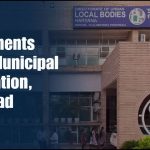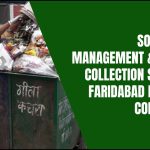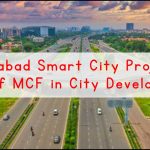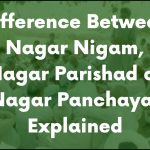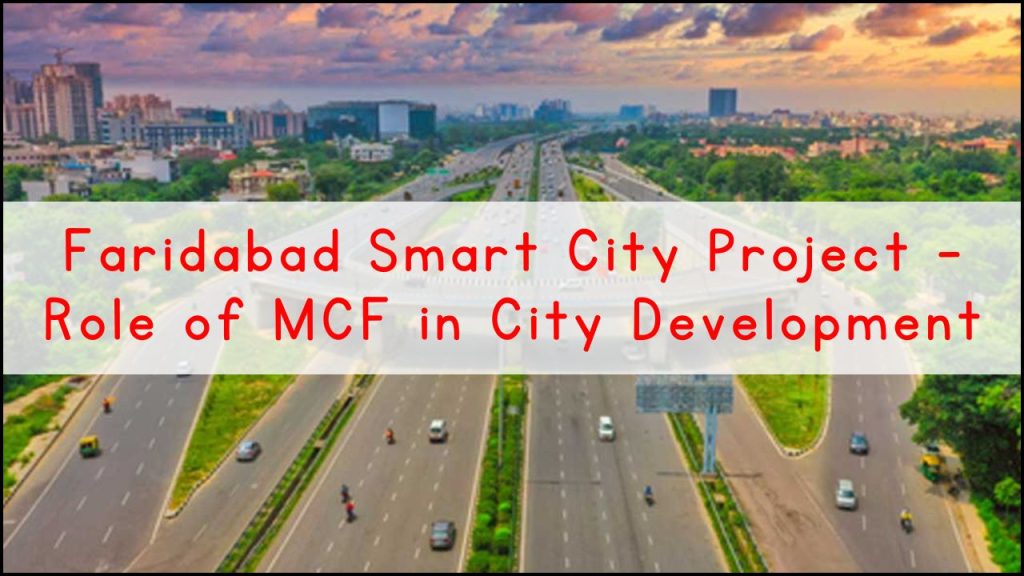
Faridabad, a major city in Haryana, is among the 100 cities selected under the Smart Cities Mission. The Smart City Project aims to improve urban infrastructure, enhance quality of life, and ensure sustainable development. Municipal Corporation Faridabad (MCF) plays a key role in planning and implementing smart initiatives. The project is supported by both the Central and State Governments. Faridabad Smart City Limited (FSCL), a special purpose vehicle, was formed to handle smart city projects.
Smart City Objectives
- Infrastructure improvement in urban areas.
- Efficient delivery of public services.
- Use of digital technology in governance.
- Sustainable use of energy and resources.
- Inclusive development for all sections of society.
Role of MCF in Faridabad Smart City
1. Planning and Coordination
- MCF prepares the Smart City Proposal (SCP) based on public feedback and expert suggestions.
- MCF coordinates with the Haryana Government and Central Government departments for funding and approvals.
- Urban development plans are aligned with the Smart City Mission’s goals.
2. Infrastructure Development
- Roads, water supply, sewer lines, and drainage systems are upgraded under MCF’s supervision.
- Smart roads are developed with proper signage, street lighting, and pedestrian paths.
- MCF ensures that new infrastructure is disaster-resilient and eco-friendly.
3. Waste Management
- MCF implements door-to-door garbage collection and scientific waste segregation.
- Solid Waste Management plants are established with modern equipment.
- Citizen participation in cleanliness drives is encouraged through awareness campaigns.
4. Water Supply and Sanitation
- MCF replaces old pipelines and installs water meters.
- Water recycling and rainwater harvesting are promoted.
- Public toilets and modern sewage systems are constructed.
5. Green Spaces and Environment
- Parks and green belts are developed and maintained by MCF.
- Tree plantation drives are conducted in collaboration with residents.
- Solar energy is promoted in public places and government buildings.
6. Smart Governance
- Digital platforms for complaint redressal and civic services are introduced by the MCF.
- Online payment systems for property tax, water bills, and other utilities are implemented.
- Citizen feedback is collected through mobile apps and online surveys.
Smart Features Introduced in Faridabad
| Feature | Description |
|---|---|
| Smart Roads | Roads with smart poles, CCTV cameras, and traffic signals |
| Public Wi-Fi Zones | Free internet in selected areas for public use |
| LED Street Lighting | Energy-saving lights installed across the city |
| Integrated Command Center | Centralized monitoring of traffic, waste, security, and utilities |
| E-Governance Portals | Digital access to services like licenses, taxes, and birth certificates |
| Solar Energy Use | Solar panels on public buildings and bus stops |
| Smart Parking | Sensors for parking availability in busy market areas |
| Water ATMs | Clean drinking water stations at low cost |
| Smart Classrooms | Modern teaching tools in municipal schools |
| Electric Buses | Environment-friendly public transport options introduced |
Major Areas Covered Under the Smart City Plan
- NIT (New Industrial Township): Focus on road and sewer upgrades.
- Old Faridabad: Heritage conservation and beautification projects.
- B.K. Chowk to Badhkal Lake stretch: Developed as a smart road corridor.
- Sectors 20 and 21: Implementation of solid waste management systems.
- Sectors near Metro Stations: Creation of integrated transport hubs.
Public Participation
- MCF conducts meetings and awareness drives to involve residents in development work.
- Residents share feedback through online platforms and town hall meetings.
- Resident Welfare Associations (RWAs) collaborate with MCF for the maintenance of smart infrastructure.
- Schools and colleges are involved in environmental and cleanliness programs.
Achievements of the Faridabad Smart City Project
| Achievement | Description |
|---|---|
| Smart Road Network | Over 10 km of smart roads developed with digital features |
| Command and Control Centre | Real-time city monitoring system operational |
| Cleanliness Ranking | Improved ranking in Swachh Survekshan due to MCF’s waste management efforts |
| Water Supply Improvements | 24/7 water supply introduced in pilot areas |
| Environmental Projects | Increase in solar energy usage and plantation drives |
| Citizen Service Centres | One-stop centers for civic services in local areas |
Challenges Faced by MCF
- Land acquisition issues delayed some road and infrastructure projects.
- Funding limitations affected the pace of implementation.
- Coordination with multiple departments required extra effort for project approvals.
- Public resistance to change created hurdles in smart utility installation.
- Maintenance of new assets like LED lights and smart kiosks demanded additional resources.
Future Plans by MCF
- Extension of smart road projects to more areas.
- Set up of underground cabling to remove overhead wires.
- Creation of more digital education centers in government schools.
- Expansion of CCTV coverage for public safety.
- Development of sustainable housing with green certification.
Final Thoughts
The Faridabad Smart City Project is a step toward modern and sustainable urban living. MCF has played a central role in converting ideas into reality. Improved roads, digital services, waste systems, and green areas show a visible transformation. Active involvement of citizens has made the journey more inclusive. With continued support from the government and people, Faridabad is moving toward becoming a model smart city.
